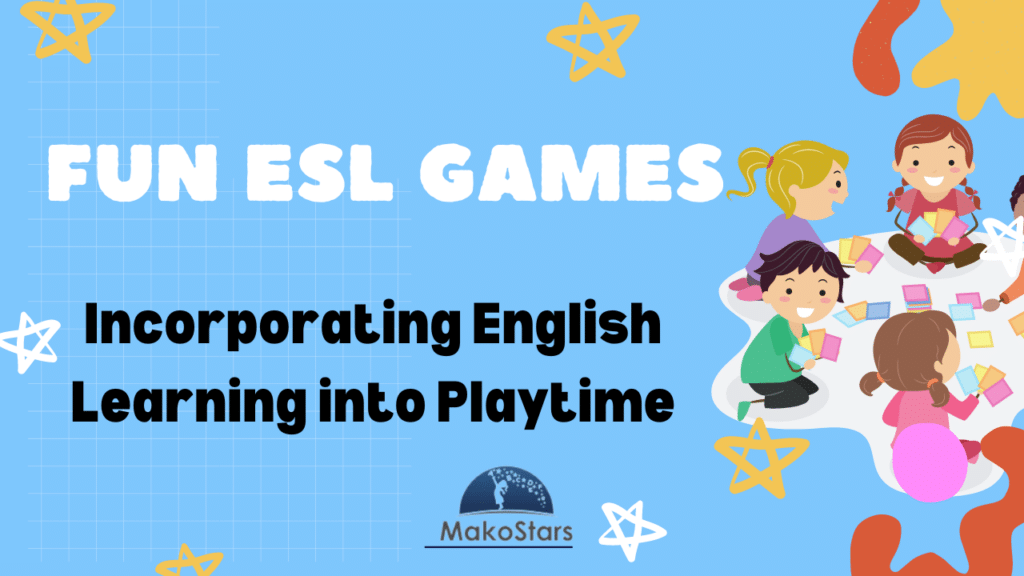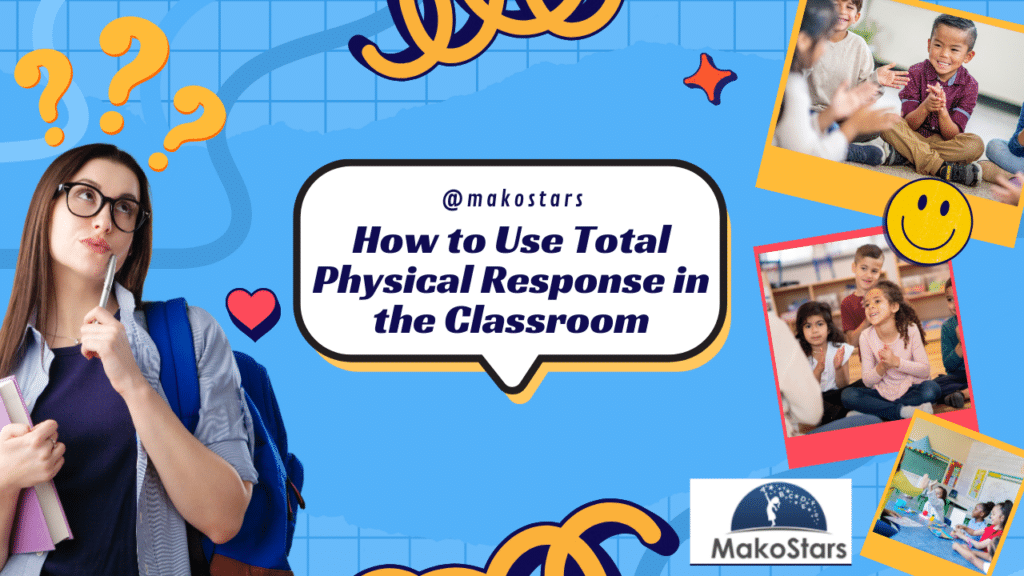Let’s ditch the flashcards! Fun ESL games are the key to incorporating English learning into playtime.
Tired of flashcards that flop? Turn playtime into prime learning time! This guide overflows with engaging study tips for incorporating English learning into everyday activities, making it fun and effective. Get ready to see your kids’ English skills blossom and watch their confidence take flight!
Table of Contents
Why Fun ESL Games and Activities Rock for Elementary Schoolers
Let’s face it, keeping kids focused these days can feel like wrangling kittens! Between iPads, TVs, and the constant stream of distractions, it’s easy for their attention to flit around like a butterfly. But here’s the good news: fun activities are the antidote to boredom!
When English learning becomes an engaging adventure, they won’t even realize they’re soaking up new words and concepts. Educational games and playful activities turn learning into a positive experience, a welcome change from the passive screen time that can leave them spaced out and hinder their ability to concentrate. They’ll be having so much fun, they won’t even realize they’re learning! Getting started with play-based learning in early years is a great idea to incorporate english into daily life.

Learning Through Laughter: Fun ESL Games and Activities
Get ready for some serious giggles! Educational games and playful activities are fantastic tools for incorporating English learning into playtime. Here are some fun English activities for elementary students that employ innovative strategies to teach English vocabulary and grammar to children:
- Role-playing adventures 👨🏻🍳🎨✨
Let their imaginations soar! Here are some ideas to get them started:
- Doctor, Doctor, Teddy Bear Needs a Check-Up! 🩺👩🏻⚕️👨🏻⚕️
Transform your living room into a bustling doctor’s office. Let your child be the doctor, complete with a homemade stethoscope (a paper towel roll works wonders!), checking their favorite teddy bear’s “symptoms” (a loose button could be a tummy ache!). They can chat about the “problem” and prescribe some pretend medicine (colorful candies, anyone?).
Vocabulary Boost: This doctor’s appointment roleplay helps kids learn new words like “symptoms,” “temperature,” “medicine,” and “prescription.” They’ll also naturally practice asking questions like “What seems to be the problem?” and giving instructions like “Open your mouth wide, please!”
Grammar Game On: While playing doctor, your child will be using simple present tense verbs (“feels,” “hurts”) and descriptive words (“hot,” “cold,” “itchy”). It’s a fantastic way for them to learn and practice grammar naturally, without even realizing it, which aligns perfectly with the concept of teaching English through play!
Roleplay games are a fantastic way for kids to act out what they learn, incorporating English learning into playtime for a truly engaging experience.
- Shopping Spree Without Leaving Home! 🛍
Turn your house into a pretend grocery store! Grab some toys, books, or even canned goods from the pantry to create a mini shopping haven. Your child can take turns being the shopper and the cashier, asking for items like “Can I have a banana, please?” or “One bottle of milk, please!”
Vocabulary Boost: This grocery game introduces your child to all sorts of fun new words like “groceries,” “cashier,” “shopper,” and “price.” They’ll also gain practice using numbers and counting items as they fill their shopping cart.
Grammar Game On: Watch your little one master simple questions and phrases like “Do you have…?” and “How much is this?” This play activity encourages them to use prepositional phrases like “in the cart” or “on the shelf,” all while having a blast!
- Pack Your Bags, Little Explorers! 🧳
Let’s jet off on an imaginary vacation! Grab your child’s favorite stuffed animals and pack a pretend suitcase. Are they heading to the sunny beach or the wild jungle? Encourage them to describe what they see, create a travel journal (a decorated piece of paper!), or act out funny scenarios like building a sandcastle or swinging on vines!
Vocabulary Boost: This pretend vacation lets your child learn new words related to specific locations like “beach” or “jungle.” They can practice using words like “transportation” (plane, car) and even explore new vocabulary related to the chosen theme, like “sandcastle” and “monkey.”
Grammar Game On: As your child narrates their pretend trip, they’ll naturally use past tense verbs (“went,” “saw,” “did”). Their descriptions of the scenery (“The sand is hot!”) involve using adjectives and comparative words (“bigger waterfall than the one yesterday!”).
Here are some Tips for getting the most out of roleplay
Looking for more Fun English Learning Activities for the classroom? Read out blog article below 😀😀

Storytelling Fun ESL Games
- Story Time Spin-Off: Silly Sentences Together! 📕
Ever wished your bedtime story could go on forever? This next activity is the perfect way to keep the story going even after the last page! Grab a comfy spot and take turns adding sentences to a story together. Start with a simple line like “Once upon a time, there was a brave little…” and see where your children’s imaginations take you!
Will their brave little hero be a daring knight rescuing a princess from a grumpy dragon? Or maybe it’s a mischievous monkey who accidentally lands on the moon? There are no wrong answers, just a ton of giggles and English practice!
Vocabulary Boost: This silly story time helps kids brainstorm and use new words. They might describe their brave knight’s shiny “armor” or the princess’s flowing “gown.” The possibilities are endless!
Grammar Game On: As you build your story together, your child will be practicing using all kinds of cool grammar skills, like past tense verbs (“went,” “said”) and connecting words (“and,” “but”). It’s a fantastic way to explore sentence structure in a fun and interactive way!
- Bringing Books to Life: Act It Out! 🎬
Dust off a favorite children’s book and get ready to put on a show! Act out the story together. You can take turns narrating or assign different characters. Will your child be the grumpy green Grinch stealing Christmas, or maybe they want to be the brave little Red Riding Hood facing a “big, bad wolf”?
Vocabulary Boost: Acting out a story helps kids understand and remember vocabulary in a new way. They’ll naturally hear and use words from the book, like “grumpy” for the Grinch or “brave” for Red Riding Hood.
Grammar Game On: While acting out the story, your child will be practicing using different verb tenses (present tense for narrating, past tense for acting out events) and expressing emotions through their voice and actions. It’s a fun and engaging way to learn!
- Storytelling dice 🎲
Feeling creative? Let’s build a story together using the power of dice! Create a dice with fun prompts like characters (pirate, princess, robot), locations (jungle, spaceship, castle), and problems (lost treasure, spaceship crash, missing crown).
Roll the dice and see what wacky story emerges! Is it a brave princess who crash-lands in a robot-filled jungle? The possibilities are endless!
Vocabulary Boost: This dice game is a goldmine of vocabulary learning. Your child will encounter new words related to the rolled prompts, like “jungle” and “robot,” and practice using descriptive language to build their story.
Grammar Game On: As the story unfolds, your child will be a grammar whiz! They’ll be stringing words together to create sentences, using different verb tenses to show what’s happening now and what happened in the past, and maybe even adding a few adverbs to describe how things are happening (slowly, quickly, excitedly).
- Bonus Tip
Don’t forget to add a splash of color! While acting out a story or building your dice tale, encourage your child to use descriptive language that includes colors. Is the princess’s dress a bright “yellow” or the spaceship a sleek “silver”? Every detail adds to the story and helps your child learn more vocabulary.
English Language-based games
Board games and card games can be a fun way to learn and practice English. Here are a few ideas:

- Go Fish, But Make it English! 🎣
Remember the classic game “Go Fish”? We’re giving it a fun English twist! Instead of collecting sets of cards based on suits (hearts, diamonds, etc.), players will be collecting sets of cards based on English vocabulary words.
Here’s how it works
Choose a category (animals, colors, food) for your vocabulary set. You can use pre-made flashcards or create your own cards with pictures and words.
Deal out cards to each player.
Players take turns asking each other for specific vocabulary words. For example, if a player has a card with a picture of a dog, they might ask, “Do you have any animals?”
If the other player has a card with an animal (like a cat), they must give it up.
If they don’t have an animal, they have to say “Go Fish!” and draw a card from the deck.
The first player to collect all the cards in a category wins!
Benefits: This twist on “Go Fish” helps kids practice asking and answering questions in English, which is an excellent example of incorporating play into the classroom. They’ll also be exposed to new vocabulary words related to the chosen category, boosting their overall language skills.
- Bingo with a twist ✅
Here’s how to play:
Create bingo cards with squares filled with pictures or simple phrases like “red apple,” “big cat,” or “open the door.” You can make multiple cards with different layouts for added fun.
Have a pile of cards with pictures or phrases written on them.
Take turns calling out the words or descriptions from the pile.
Players mark the corresponding picture or phrase on their bingo card if they have it.
The first player to complete a row, column, or diagonal line on their card shouts “Bingo!” and wins!
Benefits: Picture bingo helps younger learners associate words with pictures, strengthening their vocabulary foundation. For older kids, bingo with phrases encourages reading and comprehension skills in English.
- Guess the Word: Become a Clue Master! 🕵🏽
One child thinks of an English word and gives clues to help the others guess it. They can describe the word, use synonyms, or act it out. This game is perfect for developing vocabulary and descriptive language skills.

Here’s how it works:
One player thinks of an English word and keeps it a secret.
The other players take turns trying to guess the word.
The clue giver can help by describing the word, using synonyms (words with similar meaning), or even acting it out if allowed by the group.
Players can ask clarifying questions to narrow down their guesses.
The first player to guess the word correctly wins the round, and a new player gets to choose the next word to be guessed.
Benefits: This guessing game encourages creative thinking and vocabulary exploration. As players describe words or act them out, they’ll practice using different types of language to communicate effectively.
Teaching Tricks: Making Words Stick
Want to help your child remember all those awesome new words? Check out these cool teaching tricks:
- Memory magic with mnemonics: Use silly sayings or rhymes to help them remember new words or grammar rules, for example:
Spelling Rule: “Principal” vs. “Principle”. Mnemonic: “The principal is your ‘pal’ and the ‘principle’ is a rule.”
Spelling Rule: “Piece” vs. “Peace”. Mnemonic: “PEACE is what we seek, and PIECE is what we eat.”
- Pictures are worth a thousand words: Use visuals like flashcards or pictures to connect words with their meanings.
- Sensory adventures: Engage their senses with multisensory activities, like singing English songs or acting out words.
Tips for Parents: Encourage participation in games for learning English at home
Parent-guided English learning activities offer a relaxed way to practice your kids’ language skills
As you’re your child’s biggest cheerleader, playing English learning games at home is super important! These games make learning fun and exciting while boosting english vocabulary for elementary children. From building vocabulary to mastering grammar, these parent-guided English learning activities offer a relaxed way to practice your kids’ language skills.
Plus, they’re awesome for family bonding! By playing together, everyone gets involved and creates positive memories around learning. These games help kids feel confident in their abilities and develop a love for learning that lasts a lifetime.
Here are some ideas for incorporating English learning into playtime at home, even if English isn’t your first language, all aimed at making English learning enjoyable for kids:
- Cozy up with translated books
Find children’s books translated into your native language and English. Read them side-by-side, pointing out the English words and their translations. This can help your child connect the new language to their familiar one.
- Subtitle surprises
Turn on subtitles in English while watching their favorite shows or movies in your native language. This will expose them to English words and phrases in a familiar context.
- Sing along in English
Find catchy English children’s songs and sing along together. This is a fun way to learn new vocabulary and practice pronunciation.
- Cartoon capers
Let them watch their favorite cartoons in English. It’s a fun way to pick up new phrases and pronunciation.
- Labeling around the house
Turn your home into an English learning adventure by labeling objects with their English names. It’ll be like a constant vocabulary treasure hunt!
You can read a more in-depth article about how to make learning fun at home here.
The Final Chapter: Learning with a Smile
Playtime is the key to unlocking a love for English! These games and activities create a language-rich environment that fosters growth and fun. Remember, patience is your superpower! Celebrate small wins, prioritize fun over perfection, and be your child’s biggest cheerleader.
By incorporating these tips and keeping the focus on laughter and exploration, you’ll transform learning English into an adventure they’ll never forget! These creative games are your tools to raise a happy and confident little linguist. With the aforementioned creative English games for kids, learning English can be an adventure they’ll never forget.



